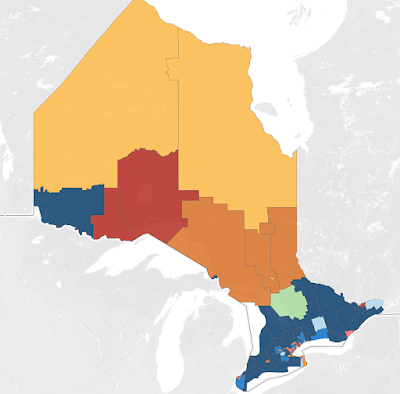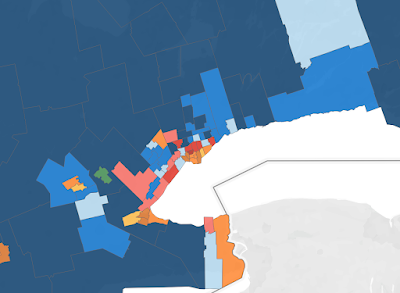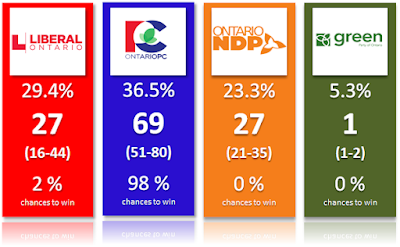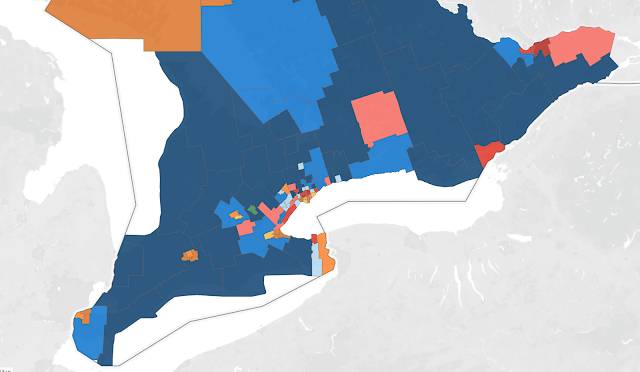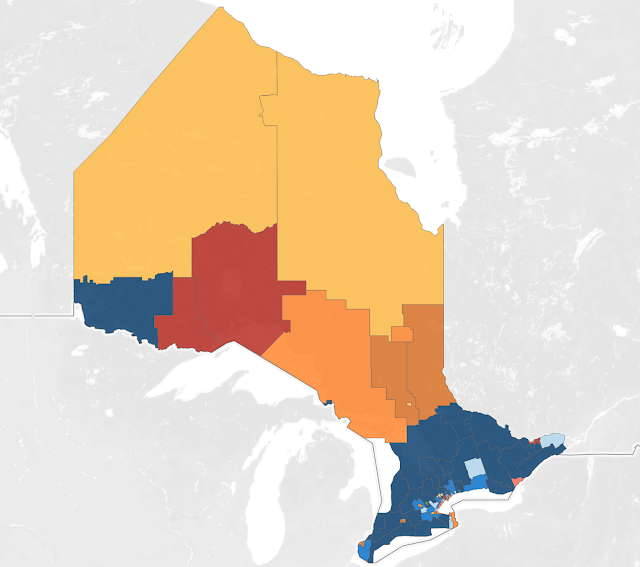While I offered a first look a few weeks ago, I hadn't made any projections until now. The reason being that we simply didn't have good enough data to even try. But this changed yesterday with the release by Elections Canada of the fundraising numbers from the first quarter.
Fundraising is by far the best indicator of where a leadership race stands. It isn't perfect and surprises can still happen but it beats polls and other measures. And despite what some like to pretend, it is absolutely possible to project leadership races -- it's just that there is more uncertainty. I have been quite successful with the last two CPC races (although I did have Bernier winning in 2017, mostly because Scheer ended up winning more points than expected in Quebec) as well as some of the PQ races.
So I took the data and did the following. I calculated the percentages per province (or regions for the Atlantic and the Territories) of the total donations (amounts) and the number of donors. The latter is usually a better predictor (it's one member, one vote ultimately, which means that it doesn't matter if a member gave $100 or $1,000, it's still only one vote at the end. And yes I'm aware of the electoral system but that's another story, see below). I then did a weighted average of the two with a 75% weight attributed to the number of donors and 25% to the amounts. While not simply use the number of donors only? Because having big donors, like Charest, can be a sign of a strong organization and it can help. So I want to use both. Ultimately I'd like to also mix in some polls but we haven't had good enough ones so far. Once I had the percentages per province/region, I assigned the number of points (so if you are at 50% in Quebec, you get 3900 points).
Here are the results for the first round:
Poilievre is easily ahead. Which isn't surprising, whether you use the fundraising data, endorsement, the polls or Google Trends, Poilievre is always ahead and close or above of a first-round win. If the election was tomorrow, there is little doubt Poilievre would win. His position also appears (at least to me) more solid than Bernier's or MacKay's. What I mean by that is that Poilievre is liked (loved) by many in the CPC. He's not leading because nobody better is running. He's leading because that's the leader most want, period. The one province where he likely needs to work harder (and organize better) is Quebec. If he could do this, he'd win in the first round easily.
Yes we should include some margins of error. I'll do so by looking at the accuracy of the projections with the results in 2017 and 2020. But I didn't have time today to do so (I was in an economic articulation meeting all day).
Charest is doing quite well if we only look at the overall amounts collected ($488k to 545k for Poilievre). But Charest achieves this only thanks to a lot of large donations. While Poilievre averages $163 per donation and has 3,336 of those, Charest is at $855 in average but only has 571 donations (note: those are donations, not single donors. There as well I'll need to clean the data in the next few days). Moreover, Charest is really only competitive thanks to Quebec where he represents 60% of the donors and 90% of the amounts collected! Outside of Quebec, Charest is more often than not a distant third, including in Ontario where he only has 7% of the donors. It gets worse as we move West.
Lewis is exactly where we expected her to be. As the only SoCons candidate, she is pretty much guaranteed 15-25% of the votes. Unfortunately for her, there isn't a Sloan candidate whose voters could then help her climb higher this time around. I suspect Baber's voters might prefer Poilievre or Lewis over the other two but it's still wouldn't be enough for Lewis to win. However, it is absolutely possible that Lewis would make it to the last round versus Poilievre. In which case I really wonder what would happen with the second-choices of Charest's voters. I suspect many wouldn't have ranked Poilievre and even less Lewis, so many votes would likely be dropped.
Aitchison is doing what we would expect (he had a hard time raising the 300k necessary to qualify) while Baber is doing better than I thought, but I guess he has a certain strong following and fundraising could overestimates him.
I want to talk about Brown and the really weird campaign he's running. We know, from how he won the Ontario PC leadership, that he's supposedly good at signing up members, especially from ethnic and religious minorities. But so far, we have no evidence that he's successful. At some point, if he's really signing up a ton of members, we should see some evidence! Polling numbers, fundraising, etc. So far, Brown is a complete failure. Also, it's worth pointing out that his campaign is super weird, to the point that it feels phony at times. His Twitter accounts has over 60k followers but his tweets usually get 20-50 likes. He has not given a single interview to traditional media. And the one interview we have is full of red flags. He shows clear contempt for the current CPC base and is openly talking of a takeover. Many of his oppositions, including on Israel, are completely incompatible with the CPC. His average donation is close to $1,600, by far the highest among the six candidates. This doesn't really scream grassroot support among ethnic and religious minorities to me. I honestly don't know what he's doing. All I know is that so far, based on every metric we have, he's below 5%. I originally thought he'd be the main challenger to Poilievre but I have fully changed my mind on this. I also maintain what I said: if Brown were somehow successful, the caucus wouldn't accept him. They'd likely find a way to get rid of him.
Finally, yes the CPC uses a weird electoral system where each riding is worth 100 points (unless that riding doesn't even have 100 votes, in which case the total number of points is equal to the number of votes; This is a situation that could mean a few ridings in Quebec). So projections like these ones aren't able to capture the possible impact of where the votes are. We know, for instance, that the Bernier vote was more efficient than Scheer's as Bernier was popular with urban voters (it was in 2017), so winning ridings with fewer members. We saw the same phenomenon with MacKay. So Charest might be slightly higher than what you see here but he's still closer to Lewis and fighting for second than of first place.
Alright, that's all for this very early and rough projections.

